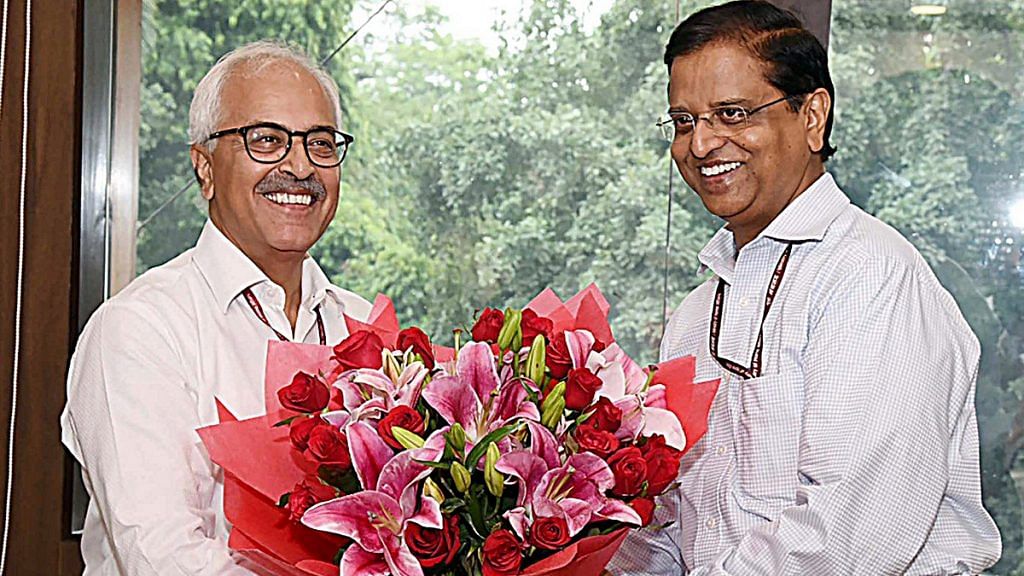New Delhi: The spate of resignations from the Indian Administrative Service (IAS) in the last few weeks has left the fraternity curious, divided and worried.
In July, former finance secretary Subhash Garg offered to resign from the government soon after he was abruptly shunted out from the finance ministry — a move that was seen as a “protest resignation” by some of his colleagues in the service.
Then, in August, G. Kannan, a young officer of the Arunachal Pradesh, Goa, Mizoram and Union Territories (AGMUT) cadre left the service, publicly expressing his reservation and disillusionment with the actions of the government of India in Jammu and Kashmir since 5 August.
Days later, Karnataka cadre officer S. Sasikanth Senthil resigned from the IAS, arguing that it was “unethical” to be an IAS officer when the “fundamental building blocks of diverse democracy are being compromised”.
The same day, Kashish Mittal, an AGMUT cadre officer posted in the NITI Aayog, resigned for being posted to the Northeast.
Warning signs
While the resignations may be too few to be called a trend just yet, they have become the talking point among civil servants, with most within the fraternity convinced that they are early “warning signs”.
“At least two officers have resigned publicly stating that there is a crisis of conscience,” said retired IAS officer T.R. Raghunandan. “We ought to sit up and take notice.”
What makes the resignations unusual is that the officers have not left the service for better avenues in the private sector, but instead left what was a very secure future to follow their ethical calling, he pointed out. “They won’t even get their pensions…They’re putting a lot at stake,” Raghunandan said.
K.B.S. Sidhu, a senior Punjab cadre officer agreed. “It is too early to call it a trend, but these are early signs that the IAS Association, the government, DoPT, etc. should take note of,” he said. “It cannot be ignored because this kind of a public statement of why one is resigning and how their voice is being stifled is new,” Sidhu said.
Stifling conduct rules
While officers admit that several of them have left the lucrative service for better opportunities in the private sector or to join politics in the past, seldom have they quit over “national issues” that are beyond the scope of their domain.
“Also, their resignations highlight the issue of Conduct Rules once again,” said Sidhu. “Whether or not by their very nature, Conduct Rules can constitutionally be regarded as a ‘reasonable restriction’ on the fundamental right of the freedom of speech and expression, is an issue which has not been tested legally.”
The rules governing the conduct of India’s bureaucracy largely ensure that officers do not divulge confidential information or criticise government policy, and remain politically neutral.
“It is not like I didn’t know of the Conduct Rules before I joined the service,” said Kannan. “But right now, I felt that my freedom of expression is more important than delivering my service…I understand that the rules are there, that is why I’ve left the service, and am not criticising while staying in it.”
“I think the space for dissent is shrinking, and that is not good for the economy, society democracy or polity of this country,” he added. “One cannot make greed, fear of administrative action or trolling censor ourselves.”
Following his resignation from the service, Kannan has faced a lot of trolling and criticism, even from some peers with the civil services. Some have argued that officers should remain concerned with their own job, and do what is in their control efficiently and responsibly.
“It is not like their resignation will change anything,” said an IAS officer who did not want to be named. “As officers, we are given specific areas of work…When we are uncomfortable with something, we can express ourselves in file notings, but other than that, we should use the opportunity given to us to do our best.”
Serving the nation
Another IAS officer pointed out that a lot of times, the officers who leave the service do so on account of personal and professional dissatisfaction. “While taking the UPSC exam, middle class people feel this is their best bet to share power… When they come into the service, they realise there is no actual power, no scope to innovate or change things, especially nowadays,” he said.
“This causes a lot of resentment. Especially, if you are not given field postings, you are reduced to glorified clerks, signing and passing files. The ambitious ones feel frustrated.”
The officer took the example of Mittal, who resigned over being transferred to the Northeast. “While taking the UPSC exam, everyone says they want to serve the nation… The Northeast is part of the nation too, why not serve there?” the officer asked. “These are the lesser talked about issues of the bureaucracy…When young officers get posted to remote parts of the country, they face a lot of frustration, and not everyone copes.”
Silence of the association
While officers remain divided over whether resigning from the service is the correct way if one feels ethically or professionally disoriented in the service, the silence of the IAS Association has alarmed many.
“I want to put it on record that the IAS Association has become completely spineless,” Raghunandan said. “How can they not speak up when young, talented officers from their service are leaving citing these problems?”
ThePrint reached the IAS Association for a comment, but it declined to comment on the issue just yet.
Also read: Subhash Garg resignation has few precedents — last senior officer quit 33 years ago
